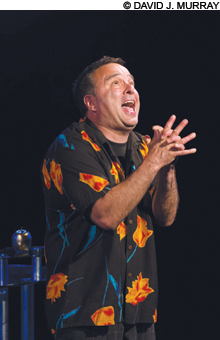
SUMMONING THE SPIRIT Brent Askari as Mike Daisey. |
The narrator of Mike Daisey's one-man show has long had a worshipful relationship with Apple electronics. But that all changed, he tells us, when a glimpse of unexpected photos on a new iPhone — photos taken on a Chinese factory floor — made him think for the first time about exactly where and how these devices are made. Thinking, as he says, is "a problem for any religion," and sure enough, a little guerrilla research on the ground, around China's now-infamous Foxconn factory in Shenzhen, spurred Daisey's appalled apostasy from the church of Apple. The fervor of Daisey's resulting theatrical exposé, The Agony and Ecstasy of Steve Jobs, is superbly sustained by the marvelous Brent Askari, in a Kent Stephens's Stage Force production at Portsmouth's chic Music Hall Loft.The Agony is at once a provocative outing of Apple's outsourced labor conditions, a history of the "narcissistic supernova of Jobsian id" that fueled Apple's trajectory, a meditation on our relationship with technology, and the confession of one self-described technophile. It has also become the subject of a well-publicized scandal, as well as a debate about "truth" in an art form that blurs the boundaries of theater and journalism: Two months after Daisey performed excerpts for the radio show This American Life, the program's producers retracted the episode, having learned that several incidents in the monologue were fabricated — that Daisey's show was in fact a mix of events he had witnessed and those he had merely heard about underage workers, the criminalization of union membership, and the nerve-destroying industrial chemical n-hexane. Daisey admitted to some fabrications, other times stuck with his story, and ultimately defended his approach, saying, "I try to tell the truth. Not with facts, always, but informed by the facts, which are vital and necessary."
He has since released (with an open license, so that anyone can stage and/or adapt it fee-free) a revised script, in acknowledgment of his fabrications, and it's this script that Stage Force presents. In a thoughtful approach to the controversy, Stephens's production also provides its own commentary, which appears as text on the upstage monitor. The commentary succinctly annotates the monologue with denials by Daisey's translator, confirmations of Daisey's fabrications by independent journalists, and the results of subsequent visits to Foxconn by new Apple CEO Tom Cook and a Fair Labor Association audit team.
Askari keeps up the momentum of Daisey's two-hour screed with intelligence, intensity, and a savvy facility for the narrative's emotional range. Daisey's writing performs nuanced techno-cultural analysis even as it revels in pop-culture laden histrionics and obscenities (Shenzhen, for example, looks like "Blade Runner threw up on itself") and Askari navigates a fine line between the script's hilarity and its disturbing implications. He's also adept at bringing the tone down suddenly, for moments of quieter, earnest recollection: Learning to write as a kid on an Apple I, his words are reflected back to him as light. Communicating in the earliest network communities, during college, he believed that as the web spread, so would freedom, so would change for the good.